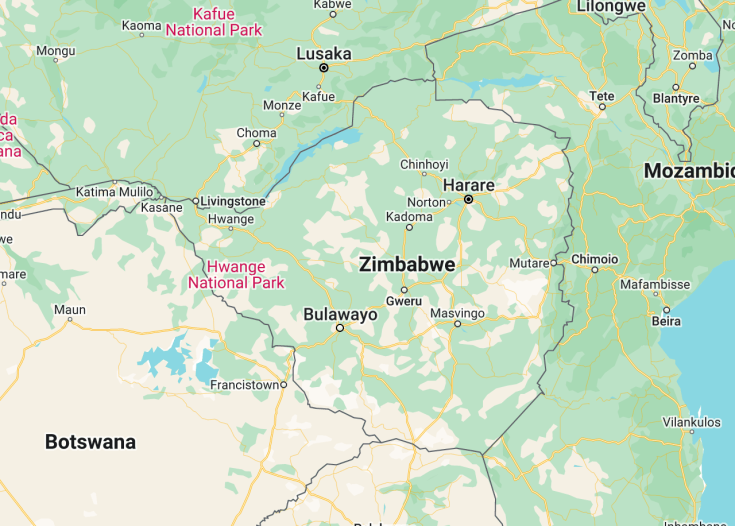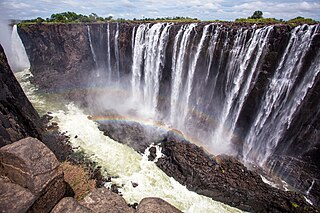Located in southern Africa, Zimbabwe is a land of profound natural beauty and archaeological significance. Home to the iconic Victoria Falls, the vast Hwange National Park, and the ancient stone city of Great Zimbabwe, this nation offers a blend of historical sites, diverse wildlife, and scenic landscapes. Zimbabwe’s warm-hearted people, with their enduring spirit and rich traditions, add depth to the traveler’s experience. From witnessing the powerful Zambezi River to interacting with local artisans, Zimbabwe delivers a tapestry of unforgettable moments.
Travel with a local guide to gain deeper insights into the country’s cultural and historical facets.
For an authentic experience, consider staying in community-run lodges, which also support local livelihoods.
Top destinations in Zimbabwe
Zimbabwe: a tapestry of cultures and landscapes
| Capital | Harare |
| Time in Zimbabwe | Central Africa Time (CAT), GMT+2 |
| Language spoken | English, Shona, Sindebele |
| Population | Approximately 14.9 million (World Bank, 2019) |
| Religion | Christianity (85%) African Traditional Religions (10%) Others (5%) |
| Currency | Zimbabwean Dollar ($, ZWL) |
| Airports | Robert Gabriel Mugabe International Airport Joshua Mqabuko Nkomo International Airport Victoria Falls Airport |
Zimbabwe, a country echoing with ancient tales and resplendent with natural beauty, beckons travelers to explore its varied landscapes and rich history. Nestled in Southern Africa, Zimbabwe has, over millennia, been the cradle of several great civilizations, each leaving its indelible imprint on the land.
The Kingdom of Zimbabwe, with its iconic stone ruins of Great Zimbabwe, stands as a testament to the architectural and cultural prowess of ancient African civilizations. These ruins, once the heart of a thriving empire, offer an evocative glimpse into a glorious past that shaped much of the region’s history.
Yet, the allure of Zimbabwe isn’t solely rooted in its ancient history. The country is endowed with diverse terrains ranging from the misty mountains of the Eastern Highlands to the vast plains of Hwange National Park. Hwange, in particular, draws wildlife enthusiasts from around the globe, eager to catch a glimpse of the Big Five and witness the great elephant herds that roam its landscapes.
No mention of Zimbabwe would be complete without the awe-inspiring Victoria Falls. Known locally as ‘Mosi-oa-Tunya’, or ‘The Smoke That Thunders’, this colossal waterfall offers not just a visual spectacle, but also an array of activities that cater to both the adventurer and the serene soul.
Adding to its splendors, the Zimbabwean culture, an amalgamation of various tribes and traditions, invites visitors to partake in its festivals, music, and dance, making a journey here an immersive experience.
Where is Zimbabwe located?
Zimbabwe is situated in Southern Africa, landlocked between Zambia to the northwest, Mozambique to the northeast and east, South Africa to the south, and Botswana to the west and southwest.
What is Zimbabwe famous for?
Zimbabwe is renowned for its historic Great Zimbabwe ruins, symbolizing ancient African civilizations, the stunning Victoria Falls, and diverse wildlife in places like Hwange National Park, making it a sought-after destination for cultural and natural explorations.
History
Prehistoric Era: Stone Age Cultures
Zimbabwe’s history traces back to ancient times with evidence of Stone Age inhabitants. Archaeological discoveries, particularly in caves and rock shelters, provide insights into the lives of these early settlers. The San, Zimbabwe’s first inhabitants, left a rich legacy of rock art that remains an important window into prehistoric life in the region.
11th to 15th Century: Rise of the Great Zimbabwe
The Great Zimbabwe emerged between the 11th and 15th centuries, establishing itself as the most significant pre-colonial civilization in the region. Renowned for its iconic stone ruins, it is from this empire that the nation eventually derived its name. The Great Zimbabwe was a hub of trade and culture, with its influence stretching as far as the East African coast.
16th to 18th Century: Successor States and Foreign Influx
As the Great Zimbabwe’s influence waned, several successor states, including the Rozvi and Mutapa empires, came to prominence. These kingdoms maintained control over trade routes and mineral resources. Meanwhile, the Portuguese and other foreign traders began arriving, marking the beginning of external influences that would shape the region’s future.
19th Century: Ndebele Migration and Colonial Intrusion
In the mid-19th century, the Ndebele people, under King Mzilikazi, migrated to the southwestern part of present-day Zimbabwe, establishing the powerful Ndebele kingdom. The latter part of the century saw increased European exploration and interest, setting the stage for the impending colonization by the British under Cecil Rhodes and his British South Africa Company.
20th Century: Colonial Rule and Quest for Independence
Under British rule, the territory was named Southern Rhodesia. The indigenous population endured land expropriations, racial discrimination, and economic exploitation. A rising tide of nationalism in the mid-20th century, championed by leaders like Joshua Nkomo and Robert Mugabe, led to an intensified struggle for independence. After a prolonged armed resistance and diplomatic efforts, Zimbabwe gained its sovereignty on April 18, 1980, with Robert Mugabe as its first Prime Minister.
21st Century: Contemporary Zimbabwe
The turn of the century saw Zimbabwe grappling with economic downturns, hyperinflation, and political tensions. Land reform programs, international sanctions, and other factors contributed to these challenges. The nation witnessed several elections, some marred by allegations of rigging and violence. The resignation of Robert Mugabe in 2017 marked a significant political transition. Today, Zimbabwe continues its journey, balancing its rich cultural heritage with the aspirations of a modern nation-state.
Visit Zimbabwe
What to see and do in Zimbabwe
Zimbabwe offers a variety of attractions and activities for visitors to explore. From stunning national parks to historical landmarks, there is something for everyone.
- Victoria Falls: Marvel at one of the world’s largest waterfalls and enjoy activities such as white-water rafting, bungee jumping, and sunset cruises along the Zambezi River.
- Hwange National Park: Experience incredible wildlife encounters on a safari in Hwange, home to diverse species including elephants, lions, and cheetahs.
- Matobo Hills: Explore the ancient rock formations and discover the rich cultural heritage of the area, including ancient rock art and the burial site of Cecil Rhodes.
- Great Zimbabwe: Step back in time and visit the impressive ruins of the ancient city of Great Zimbabwe, a UNESCO World Heritage site.
- Mutare and the Eastern Highlands: Discover breathtaking landscapes, picturesque waterfalls, and charming towns in this scenic region.
These are just a few examples of the many attractions Zimbabwe has to offer. Whether you’re seeking adventure, wildlife encounters, or cultural immersion, Zimbabwe has something for every traveler.
Events in Zimbabwe
Zimbabwe hosts a range of events throughout the year, offering visitors the chance to immerse themselves in the country’s vibrant culture and traditions.
One of the most significant events is the Harare International Festival of the Arts (HIFA), held annually in April. This multi-genre arts festival showcases a diverse range of performances, including music, dance, theater, and visual arts.
The Zimbabwe International Film Festival, held in September, celebrates the art of filmmaking and provides a platform for local and international filmmakers to showcase their work.
Other notable events include the Vic Falls Carnival, a three-day music festival held at Victoria Falls in December, and the Mbira Festival, which showcases traditional Zimbabwean music and dance.
Visitors planning a trip to Zimbabwe can check the event calendar to find out about upcoming festivals, concerts, and cultural celebrations taking place during their visit.
Best time to visit Zimbabwe
The best time to visit Zimbabwe is during the dry season, which falls between May and October. This period offers the most pleasant weather for outdoor activities and wildlife viewing.
During this time, the vegetation is less dense, making it easier to spot animals in national parks such as Hwange and Mana Pools. The lack of rainfall also means that the water levels at Victoria Falls are lower, providing better views of the magnificent falls.
However, it’s worth noting that the dry season coincides with the peak tourist season, so popular attractions may be more crowded. It’s advisable to book accommodations and tours well in advance.
For those interested in birdwatching, the wet season (November to April) offers a different experience, as migratory birds arrive in large numbers. The landscape is lush and green, but some areas may be inaccessible due to heavy rainfall.
Ultimately, the best time to visit Zimbabwe depends on personal preferences and the specific activities or attractions one wishes to experience.
Is Zimbabwe worth visiting?
Zimbabwe is a country with a complex history and a diverse range of attractions that make it a worthwhile destination for travelers. Its stunning natural landscapes, rich cultural heritage, and remarkable wildlife offer unique experiences.
However, it’s important to be aware of the challenges that the country has faced in recent years, including economic instability and political tensions. These factors may impact certain aspects of a visit, such as infrastructure and services.
That being said, Zimbabwe has made significant efforts to promote sustainable tourism and improve the overall visitor experience. The country has invested in conservation initiatives, community-based tourism projects, and infrastructure development.
While there may be challenges to navigate, Zimbabwe’s beauty and cultural richness offer a rewarding and enriching travel experience for those who are willing to explore beyond the surface. With proper planning and an open mind, Zimbabwe can be a truly memorable destination.











